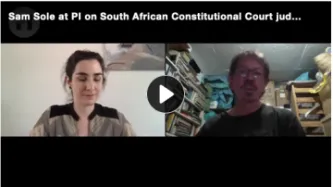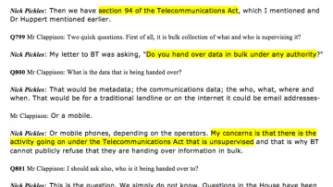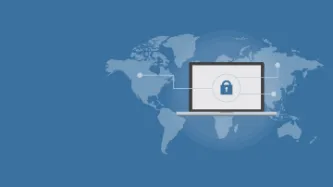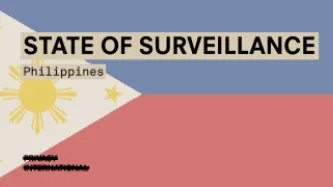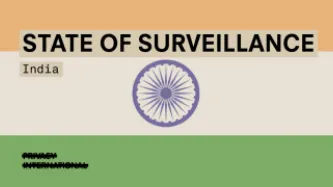Search
Content type: Long Read
… as we warn now: industry has to answer for itself which state security services it would be prepared to work for. … Terms of Service by storing surveillance data. Microsoft states that their Terms of Service “prohibit the use of our … its relationship with Israel over its commitments to privacy and human rights. What we also know: it’s an …
Content type: Long Read
… and extra-territoriality Just like with other human rights, states are bound to respect individuals’ right to privacy even when acting outside their frontiers. The UN … and media workers, including […] surveillance, and urges States to cease and/or refrain from such attacks or …
Content type: Advocacy
… that are respectful of human rights, including the right to privacy, instead of surveillance-based technological … to lead to overly broad collection of personal data by the State party.” Regarding the Data Protection Bill, the … peaceful gatherings.” Advocacy Post date 27th February 2024 Privacy International had suggested the Human Rights …
Content type: Advocacy
… be used to prevent companies from implementing important privacy and security measures. PI is joining other UK civil … subsequent litigation have repeatedly identified unlawful state surveillance by UK agencies. In response, the UK … private companies into arms of the UK surveillance state. We are concerned that many of these powers may be …
Content type: Advocacy
… date 12th December 2023 Photo by Dan Harrson on Unsplash. Privacy International joined civil society efforts to call … to meet the human rights standards on many accounts and the statement highlights five key issues. Among others, we are concerned that the Bill: gives state security agencies the power to conduct mandatory …
Content type: Report
… encryption (E2EE) contributes significantly to security and privacy. For that reason, PI has long been in favour of the … to recreate, in the digital world, the guarantees of privacy that have traditionally applied in private … but rarely secures the metadata of communications. Some states also place restrictions, including criminal …
Content type: Long Read
… requiring enhanced safeguards to protect the rights to privacy and freedom of expression against abuse. It is a … who uses online communications. In this context, the Court stated that “the independent authorising body should be … afforded by the Convention would be rendered nugatory if States could circumvent their Convention obligations by …
Content type: Advocacy
… PI submitted with TEDIC a joint stakeholder report on the state of privacy in view of Paraguay's review at the 38th session of … must review its legal framework to comply with the right to privacy including its laws regulating communications …
Content type: Video
… historical context: The constitutionally protected right to privacy seeks to be one of the guarantees that South Africa will not again act like the police state that it was under apartheid. Axiomatically, therefore, the right to privacy is singularly important in South Africa’s …
Content type: Long Read
… used by South African authorities must be explicitly stated in law so they can be considered and debated. Long … parte; 4) lacked appropriate procedures to be followed when state officials examine, copy, share, sort through, use, … Following up on our joint submission before the High Court, Privacy International submitted an amicus curiae before the …
Content type: Long Read
… Hundreds of slides obtained by Privacy International (PI) from an EU law enforcement … experts and law enforcement officials from EU member state authorities to train counterparts from agencies across … Period.” In its agreement with developers, Twitter states that “In no event shall your use, or knowingly …
Content type: Examples
… and computer science professor and his team from The Ohio State University discovered a design flaw in low-powered … and computer science professor and his team from The Ohio State University discovered a design flaw in low-powered … and/or vendors must be responsible for the security and privacy design in the products they manufacture and sell, …
Content type: News & Analysis
… used by South African authorities must be explicitly stated in law so they can be considered and debated. News … and journalist Stephen Patrick Sole, after learning that state spies had been recording journalist Sam Sole’s phone … Intelligence A ct 39 of 1994 (NSIA) violate the right to privacy and the Court should therefore declare them …
Content type: Long Read
… being treated like an arms race, what happens to our privacy and security? 5G is the next generation of mobile … network will be much more precise , adding significant privacy and security risks to users, particularly those … likely the biggest offender, but also about the United States as well as other countries and companies. In an ideal …
Content type: News & Analysis
… News & Analysis Post date 29th May 2019 Privacy International has joined a global coalition of … that “104 officers in 18 different agencies across the state had accessed her driver’s license record 425 times, using the state database as their personal Facebook service.”13 Thus, …
Content type: Long Read
… technologies prioritises corporate profits over peoples’ privacy There are solutions that can be used to address … organise, and protest without unlawful interference by the state authorities. Most of these surveillance technologies … of wrongdoing. This has happened in the past. In the United States, the now defunct National Security Entry-Exit …
Content type: Long Read
… app providers such as Telegram and Signal to avoid state censorship in countries such as Egypt, Iran, and … and have access to information online that goes against the state’s talking points. The censorship today is about … people, as well as the bizarre spectacle of members of the State Duma publicly suggesting ways to get around the …
Content type: Impact Case Study
… of data by private companies becomes increasingly privacy intrusive and widespread, data retention and … communications data. By the early 2000s, some EU member states had enacted national data retention laws, and were … European population.” Despite the decision, some EU member states continued to mandate data retention at the national …
Content type: News & Analysis
… humanos en el país. DeJusticia, Fundación Karisma y Privacy International ven un contexto favorable para que el … histórico. El reporte de DeJusticia, Fundación Karisma y Privacy International, se encuentra disponible públicamente … en Colombia, pueden consultar el reporte actualizado ‘The State of Privacy of Colombia’ (en Inglés). Este artículo se …
Content type: News & Analysis
… Rights Council, which provides the opportunity for each State to declare what actions they have taken to improve the … rights of Colombians. Dejusticia, Fundación Karisma and Privacy International see this as the perfect context for … English and Spanish , and for further information on the state of privacy in Colombia in terms of regulation, law and …
Content type: Explainer
… of ciphers A.5/1 A.5/2, which are designed to protect the privacy of the communication. Both of these ciphers had been … IMSI Catchers (or Stingrays as they are known in the United States of America) can capture a number of different pieces … fundamentally illegal, unjustifiably violating a person’s privacy. Our fight Contesting Government Data and System …
Content type: Press release
… along with promotional photographs with the briefing. Privacy International has today sent top EU and UK Brexit … powers available to government agencies in some EU member states on the other side. The briefing warns negotiators … package is being sent to David Davis, the UK Secretary of State for Exiting the European Union; Boris Johnson, …
Content type: Long Read
… Long Read Post date 30th September 2016 This week, Privacy International, together with nine other … of the Five Eyes alliance. Part 3 of the UKUSA Agreement states that the “parties agree to the exchange of the … Government Data and System Exploitation Location United States of America United Kingdom Europe Our impact Fighting …
Content type: Press release
… has been used by the Intelligence Agencies since 1998 he states: "This review of Section 94 directions has been … communications data. Millie Graham Wood, Legal Officer at Privacy International, states "Today's report by the Interception of Communications …
Content type: Long Read
… a whole lot of secrecy In the wake of litigation brought by Privacy International (‘PI’) and as the Government prepared … on section 94(1) and ‘directions given by the Secretary of State’ to the current day. These directions are general, … section 94 provides a very broad power to any Secretary of State (Home Office, Transport, Health, Culture, and so on) …
Content type: News & Analysis
… . It does not necessarily reflect the views or position of Privacy International. On 23rd March the United Nations … access to the communications surveillance capacities of the state to spy on their perceived opponents. The full extent … that the most powerful mass surveillance machine of the state is the one that is least regulated: an issue that …
Content type: Long Read
… proven and possible abuses of surveillance systems by state institutions, there is a clear need to generate policy … examples of illegal use of surveillance systems by the state against human rights defenders, journalists, activists … officially requested to send the original version of the Privacy International report Shadow State: Surveillance, …
Content type: Long Read
… . It does not necessarily reflect the views or position of Privacy International. Introduction With a history … has kept Filipinos vigilant over their hard-earned right to privacy and freedom of expression. However, it is difficult … such as the long-delayed creation of the National Privacy Commission. The Past Several prominent cases have …
Content type: Long Read
… It does not necessarily reflect the views or position of Privacy International. Introduction As part of the State of the Surveillance project, CIS conducted a review of … (which deals with interception of data). Before 1996, the state machinery relied upon the provisions of the Telegraph …
Content type: News & Analysis
… with a lawsuit following the publication in Morocco of the Privacy International report 'Their Eyes on Me'. The report … by the police following the announcement. All the claims stated in the report were in fact backed by research from …








